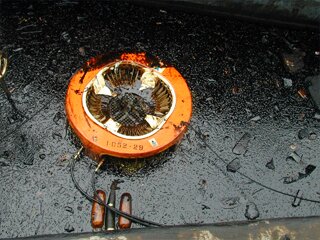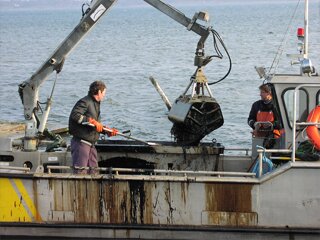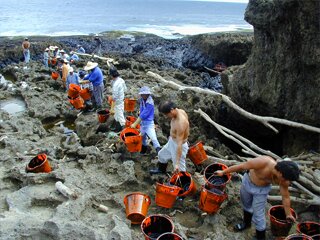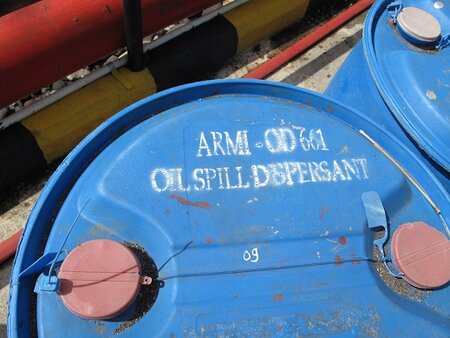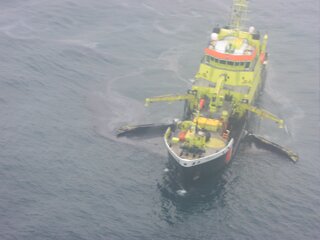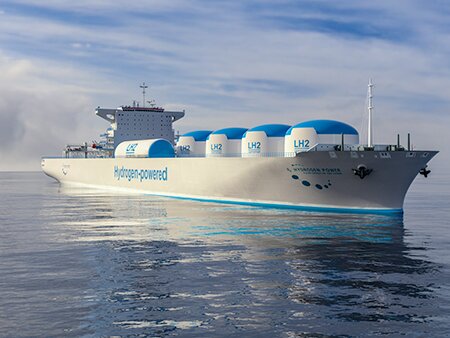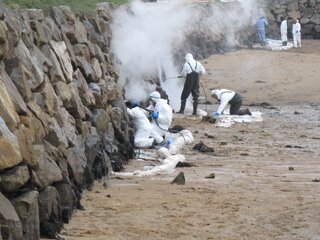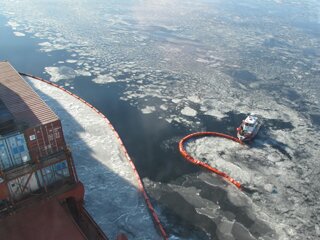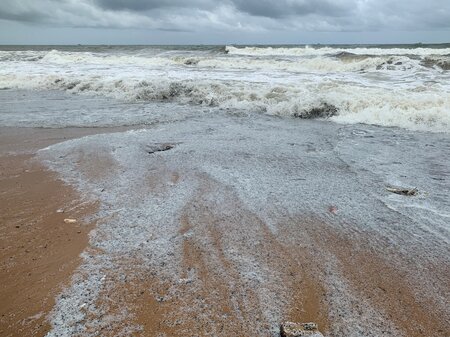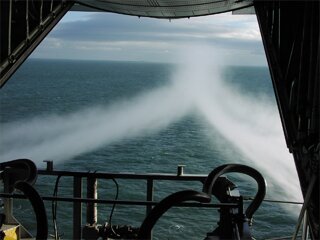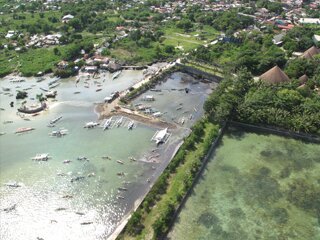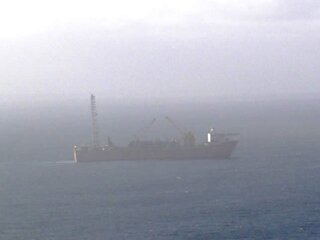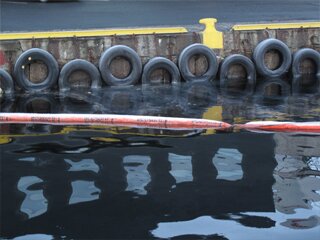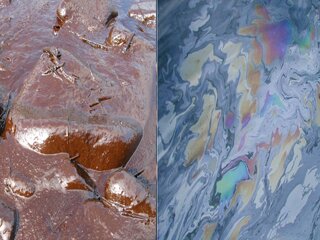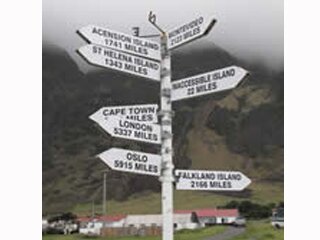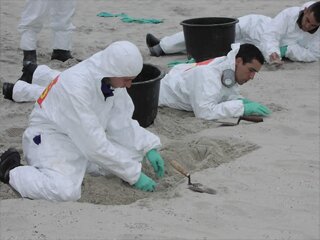Response Techniques
Once oil is spilled at sea, it will naturally spread, fragment and disperse under the influence of wind, waves and currents.
For spills in coastal waters, the oil will often drift towards the shore and become stranded due to the action of waves and tides. In order to contain the oil at the spill site, recover the oil floating on the sea and clean-up any oil that might become stranded on the shore, there are a variety of techniques that can be employed. The prevailing weather and sea conditions, the characteristics of the oiled shoreline and the nature of the oil can all combine to pose challenges to any clean-up operation.
At-Sea Response
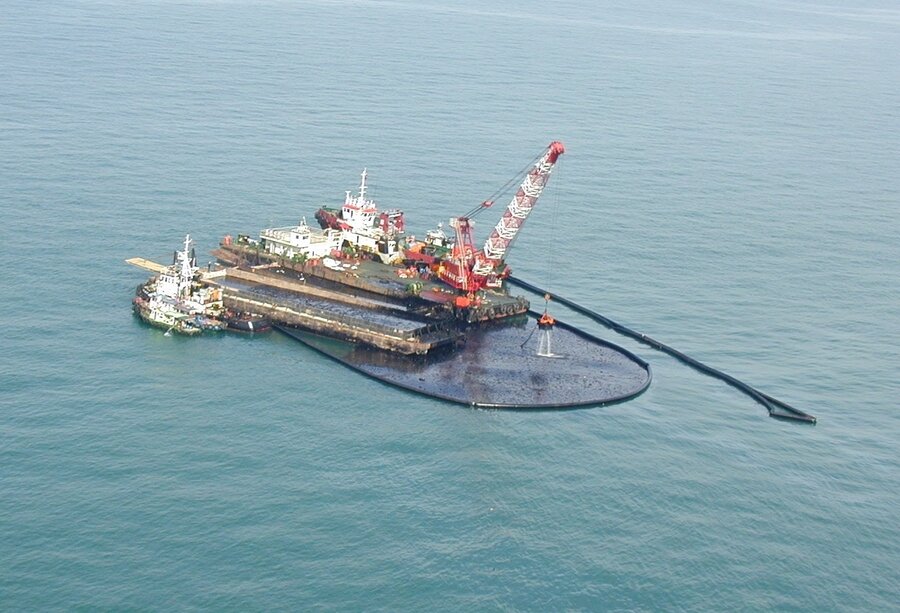
Several options are available to respond to oil at sea and can be considered in three broad strategies; containment and recovery, in-situ burning and dispersant application. The selection of the most appropriate strategy will depend on many factors, including; the response resources available, the national and local regulations on oil spill response, the spill scenario and the physical and ecological characteristics of the area impacted by the spill.
Shoreline Clean-Up and Response
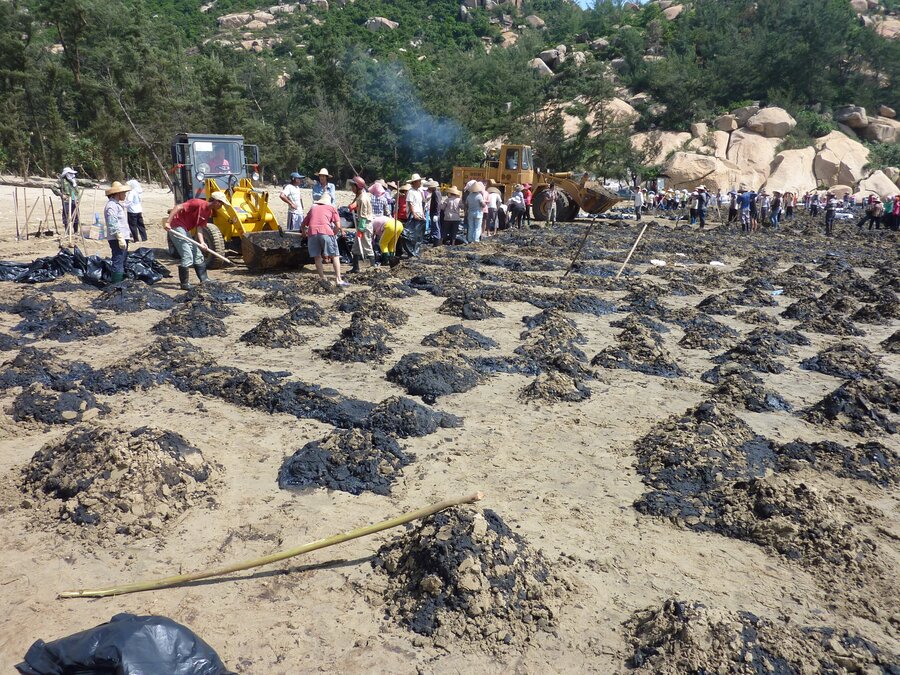
The majority of ship-source oil spills occur close to the coast and, as a result, many spills result in contamination of shorelines. Oil reaching stranding on the shore can cause significant environmental and economic impacts and may also largely determine the political and public perception of the scale of the incident, as well as the over costs.
When oil does reach the shoreline, considerable effort may be required to clean the affected areas. It is therefore essential that comprehensive and well-rehearsed arrangements for shoreline clean-up are included in contingency plans. The techniques available for shoreline clean-up are relatively straightforward and do not normally require specialised equipment. However, inappropriate techniques and poor organisation can aggravate the impacts caused by the oil itself.
Explore Documents on Response Techniques
A review of the problems posed by spills of heavy fuel oils (2001)
This review of the practical lessons which can be learnt from past events is intended to provide an informed basis for the selection of more effective response techniques and equipment, and for the development of improved spill response management and contingency planning
Categories: Response Techniques, Papers
At-sea recovery of heavy oils - A reasonable response strategy? (2002)
Within the wider debate on the effectiveness of at-sea recovery, this paper investigates whether the particular characteristics of heavy oils warrant special consideration when planning and responding to spills of these oils. The paper reviews arguments for and against greater at-sea recovery efforts than would be justified with other, lighter oils.
Categories: Response Techniques, Papers
Comparative costs of low technology shoreline cleaning methods (1999)
This paper examines the trends in costs associated with the various low technology shoreline clean-up methods that were used in the response to the SEA EMPRESS incident, by drawing on information gathered during the response and the subsequent claims for compensation from the local government councils involved.
Categories: Response Techniques, Compensation, Papers
DISCOBIOL: Assessment of the impact of dispersant use for oil spill response in coastal or estuarine areas (2014)
The DISCOBIOL research program aims to provide practical recommendations on dispersant use in coastal and estuarine areas by acquiring relevant (in terms of likely dispersed oil concentrations) and robust experimental information on the impact of mechanically and chemically dispersed oil on living resources.
Categories: Response Techniques, Dispersants, Papers
Does cleaning oiled seabirds have conservation value? Insights from the South African experience with African Penguins (2007)
Although there is general consensus among investigators that large numbers of seabirds are killed as a result of oil spills, there is disagreement, mostly in the northern hemisphere, about the extent to which oil mortality is biologically significant to local, regional and global populations.
Categories: Response Techniques, Environmental effects, Papers
International co-operation in oil spill response in European waters (2004)
It is often observed after large oil spills that there is pressure to review and change the oil spill prevention and emergency response system. In recent years this was true following the SEA EMPRESS (1996) which resulted in a reorganisation of responsibilities in the UK, the ERIKA (1999) which resulted in new IMO rules on tanker standards and the BALTIC CARRIER (2001) which resulted in a HELCOM review of response techniques.
Categories: Response Techniques, Papers
Is greener cleaner? Spill implications from alternative marine fuels (2022) - extended abstract
With the eyes of the world on reducing human reliance on fossil fuels, the shipping industry is undergoing the largest fuel revolution since the obsolescence of steam-powered vessels in the 1950s. With more vessels expected to run on alternative fuels, it is a matter of time until an incident involving these emerging fuel types occurs.
Categories: Response Techniques, Papers
Management and work force requirements for effective shoreline cleaning operations (2000)
Based on ITOPF's extensive experience of spill clean-up around the world and quantitative data from recent spills in the UK, France, Turkey and Argentina, the paper will examine the wide range of technical, organisational, logistic and financial problems facing those responsible for managing shoreline clean-up operations.
Categories: Response Techniques, Papers
New directions in marine pollution control (1999)
The paper begins by examining the incidence of major marine oil spills from tankers and other types of ships before describing the potential for controlling the resulting pollution.
Categories: Response Techniques, Papers
Nurdles - one container, a billion problems (2022) - extended abstract
To supply the global demand for plastic, significant quantities of pre-production plastic pellets are transported by sea in containers. Plastic pellets, or nurdles, are lentil-sized (typically < 5mm) pre-production raw materials used to fashion almost all day-to-day plastic items. Recent analysis estimates estimated around 230,000 tonnes of nurdles are lost to the environment annually.
Categories: Response Techniques, Planning & operations, Papers
Oil spill dispersants - Myths & mysteries unravelled (2002)
The subject of oil spill dispersants has attracted greater attention in recent years as more countries have sought to develop legislation permitting their use. Claims about the improved effectiveness of 'new generation' dispersants coupled with concern about possible toxic effects have created a confused and emotionally charged arena in which to debate this topic.
Categories: Response Techniques, Dispersants, Papers
Oil spill response - Experience, trends and challenges (2000)
The paper begins by reviewing the dramatic reduction in the incidence of major tanker spills since the beginning of the 1980s. The paper then focuses on the factors that determine the seriousness of marine oil spills and the fundamental technical difficulties of combating them at-sea, in coastal waters and on shorelines.
Categories: Response Techniques, Papers
Oil spills from floating production & storage craft: Contingency & response considerations (2006)
As exploitation of undersea oil moves further offshore floating production and storage systems offer a cost-effective alternative to conventional fixed platforms and seabed pipelines. Floating systems come in a variety of designs but due to their versatility, FPSOs (Floating Production, Storage and Offloading units) are a particularly popular choice.
Categories: Response Techniques, Planning & operations, Papers
Oil spills in ports (2006)
Whilst large oil spills arising from shipping accidents often make dramatic news, most oil spills are small and originate in or near ports. ITOPF oil spill statistics for tankers, for instance, reveal that 80% of all tanker spills are less than 7 tonnes and that 80% of these arise from operational accidents such as those that might occur during loading, discharging, and bunkering.
Categories: Response Techniques, Papers
Persistent vs. non-persistent oils: What you need to know (2001)
The concept of persistence in relation to oil spills probably originated after the Torrey Canyon incident in 1967. This is when discussions first arose regarding various new measures to protect the marine environment and to manage marine oil spills, particularly in relation to liability and compensation.
Categories: Fate of Oil Spills, Response Techniques, Papers
Responding to spills in remote locations (2012)
Over the years, ITOPF has regularly attended incidents in relatively remote locations with limited response capacities and/or limited contingency planning arrangements in place.
Categories: Response Techniques, Planning & operations, Spill Response, Papers
Termination of shoreline cleanup - a technical perspective (2002)
There is always a balance to be struck between the different sensitivities and priorities on a shoreline when trying to decide the degree of cleaning which should be carried out after an oil spill and the methods that should be used. Priorities need to be set depending on the use and environmental sensitivity of the shore in question. Often, there is no simple answer which will satisfy all parties.
Categories: Response Techniques, Papers

